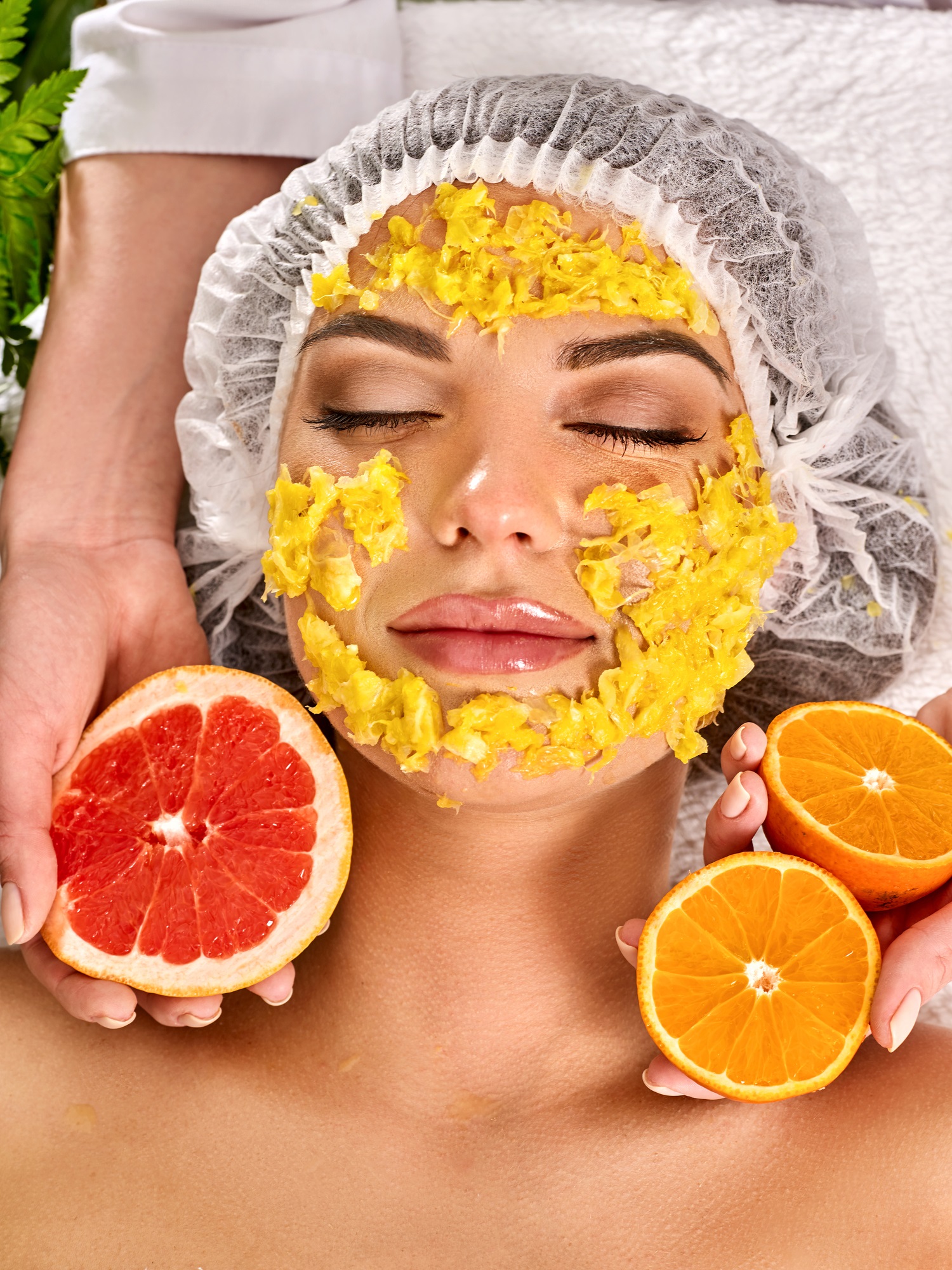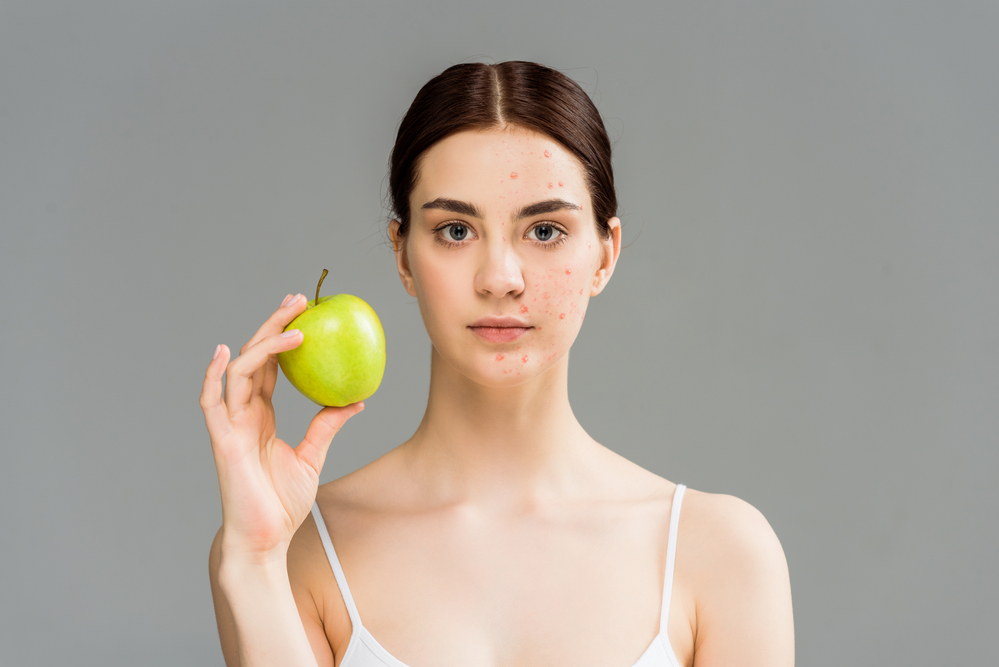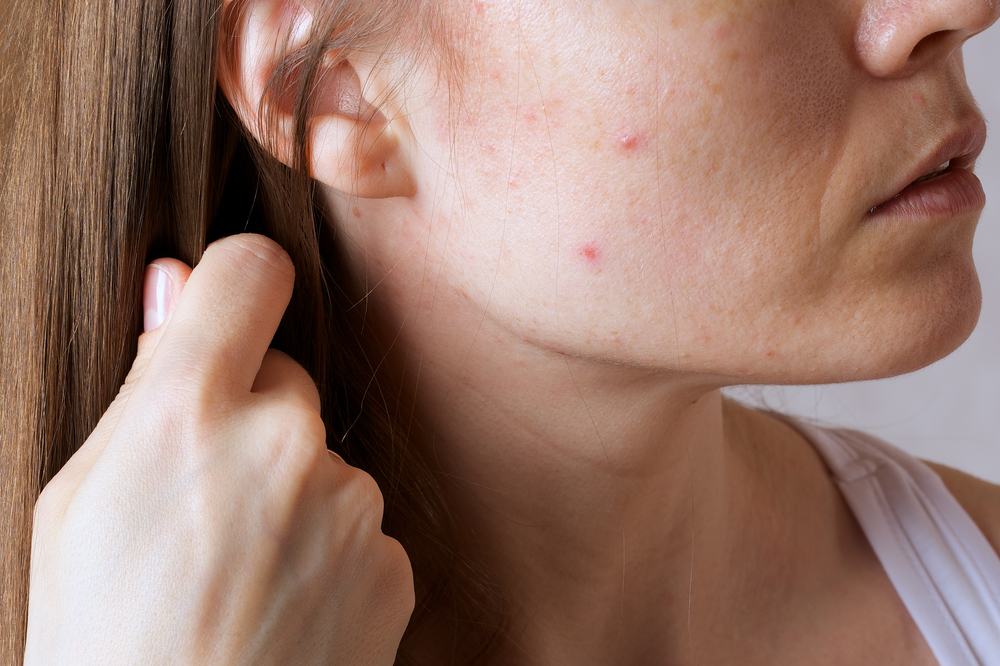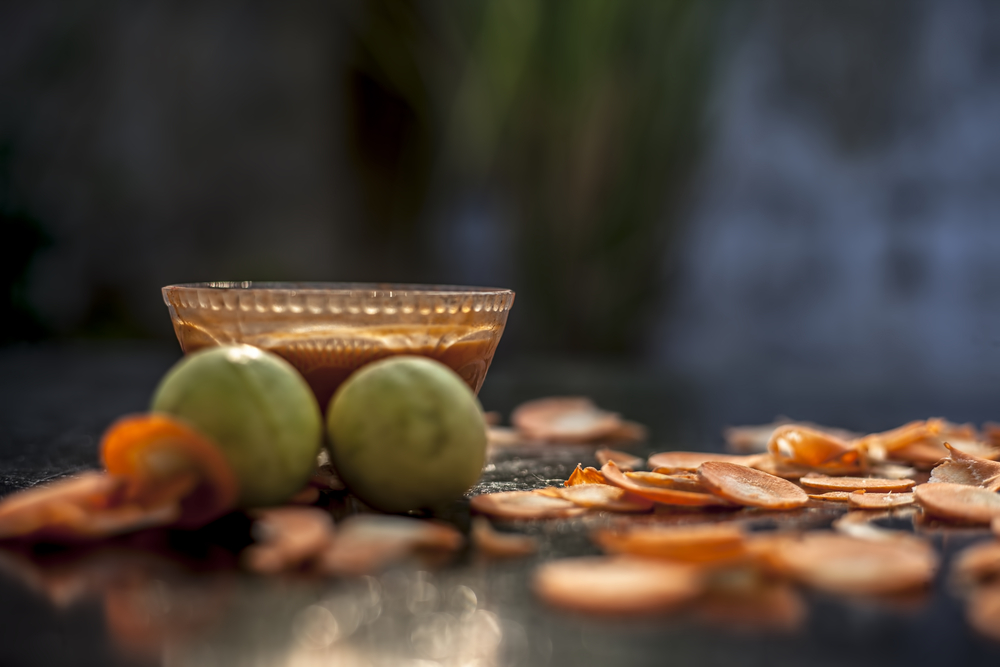Diet to treat your acne and better your skin – what is worth eating and what to avoid?

Diet for treat your acne. Unesthetic pimples on the face can spoil the mood for the whole day. In severe cases, they lower self-esteem and destroy a positive attitude for a long time. The problem of acne affects not only teenagers but also adults, for example, rosacea or hormonal acne may show up as late as in your 30’s. Most often, its basis is genetic, hormonal, seborrheic or it is a result of stress. However, improper diet also has a significant impact on the intensity of this disease. For this reason, it is worth considering changing your eating habits. Because it may turn out that eliminating certain foods from your menu will help to fight and reducing acne breakouts.

The cause of acne
Acne is caused by the skin’s excess production of sebum. Sebum, in combination with impurities, clogs the pores, which causes the formation of blackheads and inflammation, i.e. acne – this way, the body is cleansed from harmful metabolic products. Here we can put to blame an excessive amount of harmful substances present in food products. Therefore, diet is an important component in the treatment of acne and one should not forget about it and use diet to treat your acne.
What to avoid if you are acne prone?
It could be said: what should be eliminated from the diet? Many foods can be acnegenic, which means they directly cause inflammation of the skin or aggravate the unpleasant symptoms of the disease. It is also well known that a poor diet, lacking in fresh products, is unhealthy. But despite this awareness, it is hard to give up our habits and little pleasures.

If you are acne-prone, an unhealthy diet can trigger the appearance of skin lesions. You should use the diet to treat your acne. So the question arises:
What to avoid in the home menu in diet to treat your acne?
- Highly processed products – that is, those that have undergone multiple industrial processing before they reach your table. Most of the valuable vitamins and minerals have been lost as a result. On the other hand, the long shelf life proves a large amount of preservatives, as well as dyes and additives. Eating highly processed foods contributes to the overproduction of androgens. This is also associated with seborrhoea, which leads to the formation of inflammation and skin lesions.
- Food with a high glycemic index (GI) – may cause an increased secretion of sebum because the rapid rise in blood glucose causes an insulin spike (which as an effect is acnegenic).
- Colourful drinks – contain large amounts of synthetic dyes. Which do not occur naturally in food and are highly allergenic and carcinogenic. In addition, they also contain a large dose of preservatives, flavours, sugar or glucose-fructose syrup.
- Flavoured water – they don’t have much in common with water. It is a sweet drink enriched with concentrated juices and sugar or glucose-fructose syrup.
- Sweets – everyone knows that they are unhealthy, but the temptation to reach for them is huge. Dermatologists advise against even dark chocolate as it causes skin problems in many people.
- Salty snacks: chips, sticks, crackers – high salt content contributes to a rapid increase in blood pressure and a sugar spike. This is because the snacks are low in protein but high in carbohydrate.
What else you should not eat in diet to treat your acne?
- Milk and dairy products – excessive consumption may aggravate acne. Milk contains casein and whey proteins, which lead to an increase in insulin and IGF-1 hormone levels. Which in turn affects the excess production of sebum.
- Animal fats – reduce them. They have a negative effect on the hormonal profile and the composition of sebum produced by the epidermis.
- Deep-fried fatty foods and fast food – due to the content of hardened trans fats. They are created by subjecting vegetable oils to high temperature and industrial processing. Trans fats are also hidden in cookies, crisps, snacks, crackers, wafers, chocolates, cheeses, ready-made fries, tortillas, and milk desserts. Most often it is partially hydrogenated palm oil, so check the ingredients on the packaging and try to avoid it. This type of fat is very unhealthy and hard to get rid of from the organism.
- Hot spices – black pepper and hot pepper. They have a stimulating effect, can aggravate inflammation and the production of sebum.
- Stimulants – alcohol and cigarettes. The effect of their overuse is often bad skin condition.
- Coffee and tea – contains histamine, which can make rosacea worse. This substance promotes the formation of erythema and new inflammations. Histamine is also present in hot spices, sweets, alcohol, and even in spinach, tomatoes, and eggplants.
- Sugar – Some people refer to it as ‘white death’. It builds up very quickly in the form of fat in your body, it’s hard to get rid of and of course, it’s unhealthy. So let’s give it up completely and if you need to sweeten something, choose natural honey.

What should be the diet to treat acne and have a healthy complexion?
Do you know the saying ‘you are what you eat’?
This is true. The quality and type of consumed products have a significant impact on the condition of your skin. Eating a well-balanced diet can help you overcome unaesthetic pimples and alleviate their symptoms.
What products should be included in the diet to treat your acne?
- Products rich in vitamin A – this vitamin is responsible for exfoliation of the epidermis, improving the complexion and it strengthens the skin. Choose vegetables and fruits: carrots, oranges, tomatoes, melons, peaches, spinach and broccoli. But also fish, vegetable butters and liver.
- B vitamins – they soothe inflammation and reduce seborrhoea. It is worth enriching the diet with legumes, beans, spinach, asparagus, fish, nuts, almonds, liver, eggs or whole wheat bread.
- Vitamin C – has a beneficial effect on the condition of the skin, brightens, firms and stimulates the production of collagen. Good sources are black currant, citrus, red pepper, parsley, Brussels sprouts or broccoli.
- Vitamin E -this vitamin is important due to its anti-inflammatory effect. The necessary dose will be provided by avocado, Brussels sprouts, hazelnuts, spinach or groats and seeds.
- Fruits and vegetables – are a rich source of vitamins and antioxidants. As a result, they help to soothe a skin inflammation and reduce the excess of free radicals.
- Products containing healthy omega-3 and omega-6 fats – found in nuts, seeds, avocados, seafood, fish, salmon, cod, sardines. And in cold-pressed vegetable oils and flax or chia seeds.
- Zinc – very important in the treatment of acne, it soothes skin lesions and regulates the work of the sebaceous glands. Choose seafood, oysters, pumpkin seeds, liver, eggs (more precisely, yolk), grain products, beans, peas or buckwheat.

What else you should eat in diet to treat your acne?
- Selenium – has antioxidant properties, recommended for the treatment of acne. Reach for Brazil nuts, tuna, shrimp, chicken eggs, liver, halibut, sunflower seeds and sesame seeds.
- Fiber – helps to cleanse the body of harmful toxins. You will find it in green vegetables and fruits such as raspberries, currants, apples and bananas. It is also present in bran, oatmeal, buckwheat, brown whole grain rice. Or you can eat sesame seeds, sunflower seeds, or beans, pea, broad beans. Dried fruit is also a good source of fiber.
- Water – drinking plenty of water will help cleanse your body of toxins.
- Green tea – appreciated for its antioxidant properties.
- Bread and wholemeal pasta – unlike white bread and pasta, they have a low glycemic index, so you should choose whole grains products.
- Easily digestible dishes – ideally you choose to steam cook to avoid fatty foods fried in oil.
- Herbs – support the treatment of acne, have anti-inflammatory properties. Recommended instead of regular tea, for example: cistus, pansy, calendula, arnica, plantain, or witch hazel.
Supplementation of key vitamins and trace elements in the fight against acne
Of course, we are aware that the daily diet may lack the necessary vitamins and minerals. Fast lifestyle forces us to reach for ready meals and easy snacks. For this reason, it is worth paying attention to supplements containing natural plant extracts. They will help you supplement your diet with key vitamins and trace elements necessary to fight acne.
See also: How to take care of your teeth to maintain the whitening effect?

The golden mean in the fight against acne
The most important thing is to find a balance between a healthy diet and other acne treatments. An important issue is both an active lifestyle, proper care, treatment, supplementation and avoiding stress and pollution. Each case is individual, so it is worth searching and trying every available option. For example, by elimination, exclude products from the diet one by one and observe how the skin reacts to the change. In the struggle for a beautiful complexion, you have to put in a little bit of effort to get satisfactory results. It may take several months for you to achieve positive changes, but it’s worth taking action.
